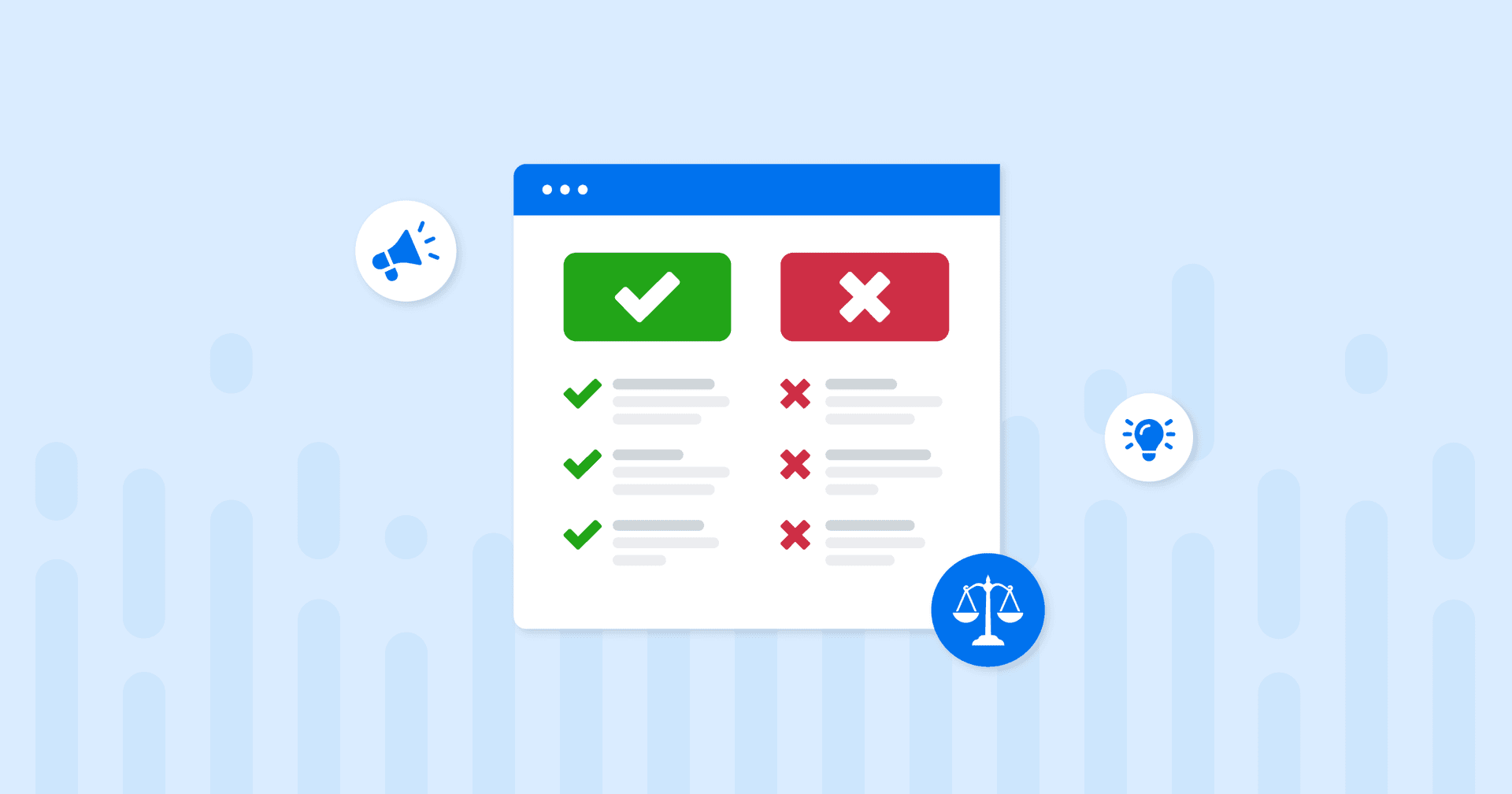Table of Contents
QUICK SUMMARY:
SEO for lawyers is a specialized practice focused on the optimization of a law firm's online presence to increase its visibility in search engine results. It involves customizing website content and structure to align with search engine algorithms, aiming to improve rankings for relevant keywords. Find out everything there is to know about SEO for law firms.
Legal matters are the real deal.
Searching for a law firm is often the result of a significant circumstance, like a divorce or a copyright infringement. Regardless of the situation, deciding on legal services is a serious decision–one that leads to life-changing outcomes.
One of the first things prospective clients do is head to a search engine and browse law firm websites. That’s where legal SEO comes in. It’s a way to demonstrate authority in the field, share testimonials, and show up on search engine results pages.
That said, law firm SEO requires a strategic approach. It’s why legal professionals turn to a law firm SEO company (perhaps like yours) to build a solid online presence. After all, they’re busy helping their clients and getting the job done.
Lawyer SEO involves many moving parts, like local SEO tactics, keyword research, link building, and technical SEO analysis. Sounds like a lot? Not to worry.
In this law firm SEO guide, we’ll cover the nuances of the industry and the implications for legal marketing. Then, we’ll share how to craft a law firm SEO strategy that drives results.
Why SEO for Lawyers Is Essential for Business Growth
Search engines are a go-to place for researching legal-related information, discovering law firm websites, and getting more information. Thus, when legal firms seek professional assistance to up their SEO game, they’re in need of help that’s critical to the growth of their business.
While Google Ads is one way to tackle the SERPs, successful SEO optimization will lead to more inbound leads, more clients, and scaling of the firm. The job of the SEO agency is to get the phone ringing and the email inbox buzzing with new opportunities.
For law firms, investing in attorney search engine optimization is an opportunity to:
Show Up on the Local SERPs: High local search rankings generate website traffic and build brand awareness. When prospective clients are researching legal services, they’ll gravitate toward the top results (especially those with favorable reviews). Therefore, law firm search engine optimization is a way to pique curiosity and enhance online visibility.
Demonstrate Expertise: Developing authoritative content is a way to convey an in-depth understanding of legal issues. In doing so, a website's search engine rankings function as a lead magnet, encouraging users to take further action (like filling out a contact form).
Reach Potential Clients: Law firms are usually well-versed in state or region-specific regulations. Therefore, a local SEO strategy is a way to establish a presence in the community and create a well-known business.
Build Online Credibility: Prospective clients need assurance that they’re choosing the right representation. A law firm’s online presence and local reviews have the power to create a positive impression.
What Makes SEO for Lawyers Different From Other Industries?
Law firms tend to be more risk-averse than other marketing agency clients. They’re known for “crossing their t’s and dotting their i’s”, so to speak. Legal firms have several unique business differentiators that therefore make law firm SEO a little bit more complex than running an SEO campaign for a local bakery.
Here's an explanation of what makes legal SEO unique and strategies for navigating common challenges.
1. The Law Has a Trickle Effect on SEO-Related Efforts
To effectively create SEO for lawyers, agencies must consider state-specific regulations.
As the American Bar Association outlines, lawyers cannot imply or state they’re experts or specialists without formal accreditation from the area they operate.
Law firms may even be penalized for misleading statements, such as referring to their practice as “the best” or “most competitively priced.” To top it off, things are constantly changing. At any given time, there may be new laws or amendments that could significantly impact legal marketing.
It’s a tricky situation to be in. You want to portray law firms in a favorable light but don’t want to breach any rules inadvertently.
So, what’s the solution? Keeping track of regulations that could affect law firm SEO services. That way, your agency won’t be blindsided by any legal hiccups.
Take a page from The Modern Firm’s book–a Michigan-based agency that specializes in legal marketing. They’ve created a living document that’s constantly updated as laws are introduced or changed, ensuring they stay one step ahead.
We've started developing legal marketing ethics guides state-by-state, which are updated by one of our in-house attorney writers. That means they're responsible for outlining specifics about website disclaimers, advertising copy, and anything related to marketing compliance. Our entire marketing team is also signed up for legal development news that comes directly to our inboxes.
Erin Ricchiazzi, Director of Online Marketing, The Modern Firm
Read More: How The Modern Firm Built a 20+ Year Legacy in the Legal Marketing Niche
2. Prospective Clients Are Conducting Life-Changing Searches
"Urgent legal aid for eviction notice".
“Quick legal response for subpoena".
“Bankruptcy filing process.”
Many legal matters are urgent, which means the clock is ticking to find law services–another reason why showing up in local search results is so important.
That said, law-related inquiries are all different. For example, one prospect may be researching divorce regulations (even though they haven’t made a final decision as to whether they’ll leave their partner). Alternatively, someone with a life-altering personal injury may need immediate legal representation.
Therefore, it’s essential to understand what a law firm offers and how organic traffic aligns with user's search intent. That way, you’ll be better equipped to conduct keyword research and create click-worthy, law-related content that will show up on search engine result pages and drive users to the law firm's web page.
3. Legal Marketing Is Locally-Based
If you’ve got a pending legal matter in New York, it’s highly unlikely you’ll search for a law firm based in Toronto.
That’s because many law firm searches are location-specific–a prospective client may need legal expertise based on the jurisdiction of a specific state.
Here’s another thing: They may not even be in the location where they’ve got a pending legal matter. For example, a CEO may have a business incorporated in California, even though they live on the East Coast.
Therefore, legal marketing must factor in geographic-based terms for all search engine optimization efforts in order to reach the right users. This includes key steps like using local keywords, acquiring high-quality backlinks, and setting up a Google Business Profile.
All local businesses need a Google Business Profile. An optimized GBP with lots of 5-star reviews stands out from competitors. A lot of users also use Google Maps to search for businesses, too.
Megan Boyd, SEO Account Director, AttornySync
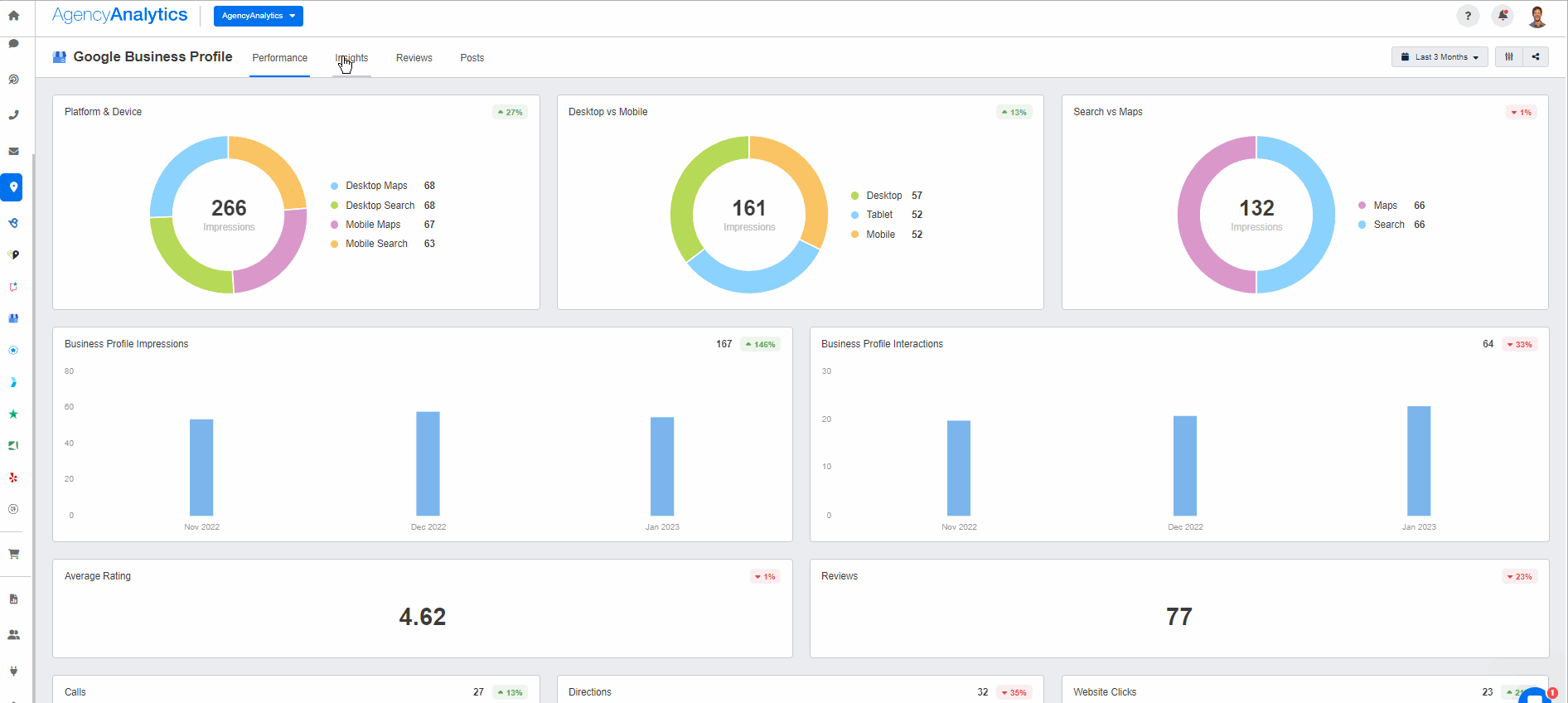
Monitor local SEO efforts with ease, including reviews and profile interactions. Drive your clients to SEO success by using AgencyAnalytics–sign up for a free 14-day trial today.
How To Create Effective SEO for Law Firms
The big-ticket question remains: What does SEO for law firms entail? It may seem intimidating, but it doesn’t have to be–let’s explore a few actionable tactics.
Understand the Sales Funnel
What does the sales funnel have to do with SEO for lawyers?
Remember, deciding on a lawyer is equivalent to a conversion. Naturally, it takes time to make such an important decision. Therefore, it’s important to understand what happens before that point and how law firms could meet the needs of their potential clients.
As a quick refresh, here’s an overview of the sales funnel, along with the types of search keywords used at each stage.
Stage | Description |
|---|---|
Awareness | Prospective clients realize they have a legal issue but may not fully understand it. They typically use informational keywords (e.g., “what qualifies as a personal injury”). |
Consideration | This stage involves reviewing legal services and weighing options. Potential clients may follow through on a call to action (e.g., calling for more details) and use navigational keywords to find a specific website (e.g., XYZ law firm Miami). |
Decision | This is a critical phase as a prospective client decides which attorney or law firm to hire. They’ll use transactional keywords that indicate conversion intent (e.g., “hire corporate lawyer Elliot and Son law firm”). |
Need a little help to find target keywords? Focus on:
Chatting with lawyers at the firm to identify popular services and common concerns from their clients. A law firm SEO expert will use this information to develop appropriate terms, understand the search intent, and create content around it (e.g., a blog post on “How to Create a Will”).
Using Google and other search engines to uncover related keyword phrases used by potential clients (e.g., look at the “People Also Ask” section).
Evaluating at the competition level and strategically choosing the best target keyword phrases (which we’ll cover next).
Conduct a Competitor Analysis
Choosing relevant keywords is a vital component of SEO for lawyers. That said, competitor law firms must be considered in the mix.
For example, you don’t want to focus solely on a primary keyword that’s overly saturated or completely off the mark. Otherwise, it may lead to reduced online visibility or even omission from organic search results.
Competitor analysis is a strategic way to see what other lawyers or firms are doing. Then, use this information to differentiate your law firm client from the crowd.
Here’s a step-by-step on how to conduct a legal SEO competitor analysis.
Step | Description |
|---|---|
Keyword Analysis | Assess the competition level for specific keywords by using a tool like Ahrefs or Semrush. Uncover any changes in search habits by using Google Trends. Then, create a list of relevant keywords and content ideas. |
Backlink Analysis | Evaluate competitor backlinks (also through Ahrefs or Semrush). Use this to discover any legal directories, blogs, or reputable sources for law firms. Also, identify the type of content that attracts inbound links. |
Local SEO Analysis | Review competitor Google Business Profiles, including their use of local keywords and listings in local directories. Identify local SEO gaps and develop strategies to help your law firm client stand out (e.g., accumulating more local reviews than competitors). |
Content Quality | Analyze competitor websites and social media platforms to understand their target audience. Identify any subject areas that competitors haven’t yet addressed. It’s a chance for your law firm client to create a unique content marketing strategy. |
Reputation and Reviews | Monitor competitor reviews on platforms like Google and Yelp. Look for any weaknesses (e.g., long follow-up times) and identify ways to address them in your law firm client’s content (e.g., “We respond to your inquiries within 24 hours”). |
Create High-Quality Content
Just like law firms, search engines want to deliver top-notch results.
High-quality content is an integral part of attorney SEO–it’s a must-have for showing up on local search engine results pages and driving website traffic.
We focus heavily on content creation and the internal keyword side of local SEO. Google prioritizes expert content and authoritative material for ranking websites. Therefore, the best places to showcase client expertise are websites, blog posts, and project pages.
Bec Moloney, Senior Account Manager, Redsteps Consulting
Google has coined a nifty E.E.A.T acronym that perfectly summarizes what law firm content must demonstrate–Experience, Expertise, Authoritativeness, and Trustworthiness.
Here’s a quick overview of this concept and how it applies to law firms:
Experience: Focus on your client’s track record of success and any quantitative data (like the example below). Include this information on their homepage and applicable website sections (e.g., “About Us”).
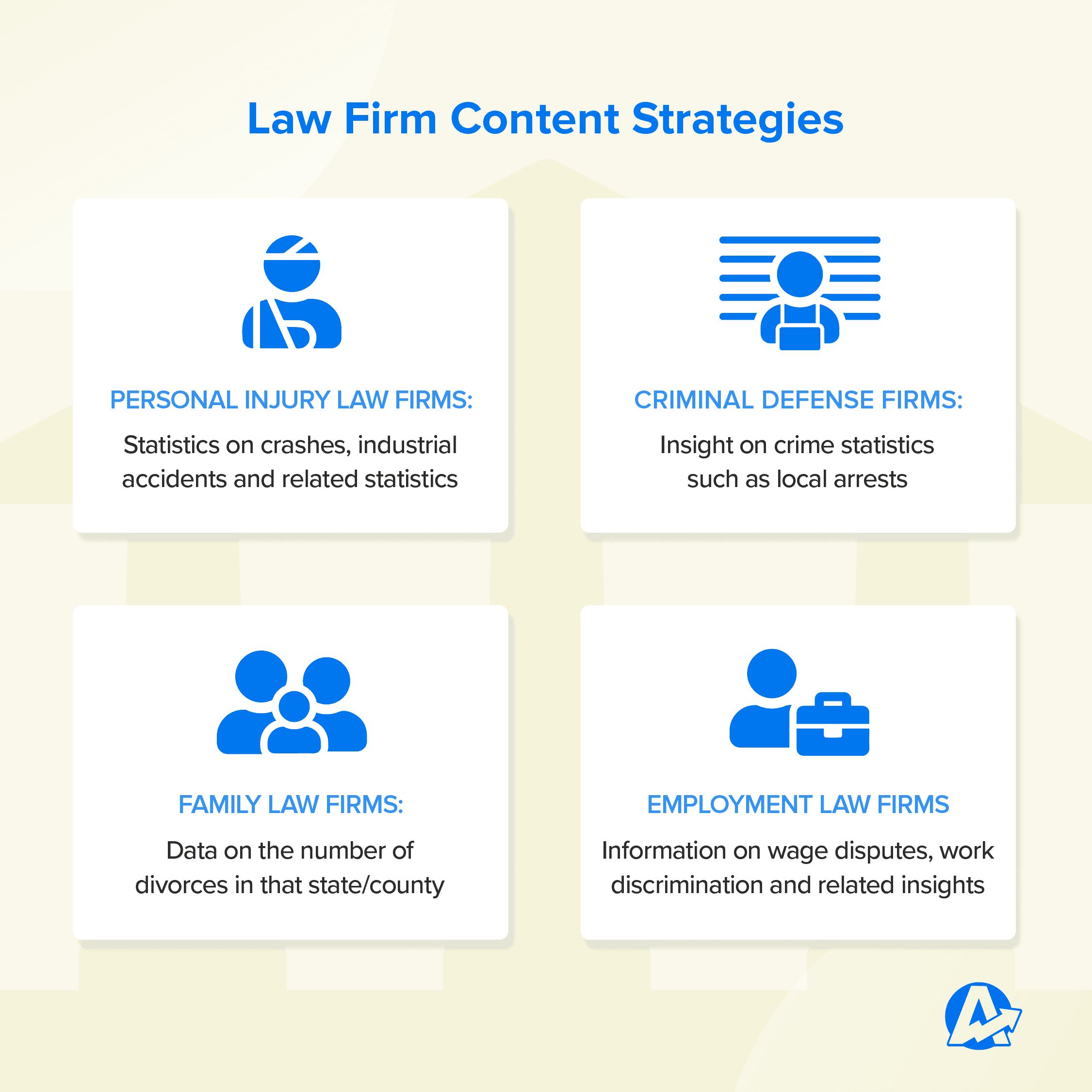
Expertise: Show that your client has in-depth knowledge of the law and legal procedures. Use a variety of content types, such as long-form blogs, infographics, FAQs, and videos.
Authoritativeness: Share any monumental legal cases your law firm client worked on. Include any news features and mentions from other reputable sources (e.g., a local legal association).
Trustworthiness: Include testimonials on a law firm's website. Also, don’t be afraid to infuse a bit of personality and show empathy for potential clients. This personalized approach builds trust and credibility.
Additionally, create content for each stage of the sales process to cover all bases–here are a few ideas for inspiration.
Stage | Content Type | Content Ideas |
|---|---|---|
Awareness | Blog posts, eBooks, Educational Videos | "5 Signs You Need to Hire a Personal Injury Lawyer”; "Your Rights After a Workplace Accident"; "Understanding Your Legal Options After Medical Malpractice." |
Consideration | Guides, Webinars, FAQ sections | "How to Choose the Right Divorce Lawyer"; "Estate Planning Basics"; “Answering common questions about bankruptcy.” |
Decision | Testimonials, Case Studies, Free Consultation Offers | Client success stories; a case study on a high-profile case won by the firm; an offer for a free consultation. |
Here’s a tip: Consider hiring team members who understand the law. For example, The Modern Firm has in-house copywriters with legal backgrounds, making it much easier to create legal-sensitive marketing materials.
The ability to research and understand the law makes a huge difference when bringing marketers on board. Our clients also appreciate attention to detail, understanding the differences between jurisdictions, and knowledge of legal ethics guidelines by state.
Erin Ricchiazzi, Director of Online Marketing, The Modern Firm
Optimize a Law Firm’s Website
An often overlooked element is technical SEO, which ensures that a law firm’s website is in tip-top shape.
In fact, the user experience should be at the forefront of any law firm SEO strategy. This involves:
Creating a well-designed website that’s easy to navigate. Include a logical site structure and clear navigation menus (e.g., sections for “About Us,” “Services,” and “Contact Us”).
Optimizing images and other media for fast page load times. Additionally, include keyword-rich terms in file names and Alt text descriptions (e.g., naming a file "los-angeles-criminal-defense-law-firm-office.jpg" with a description like "Los Angeles Criminal Defense Law Firm Office.")
Including metadata (i.e., title tags and descriptions). The meta title for a page on estate planning services could be "Top Estate Planning Lawyers in Miami.” An appropriate meta description might read, "Our Miami estate planning attorneys offer estate management services. Schedule a consultation today." Remember that meta titles and meta descriptions are the first glimpse a potential client could have of the law firm's website.
Conducting regular comprehensive website audits to identify any technical SEO issues and quickly rectify them (e.g., a declining SEO Score).
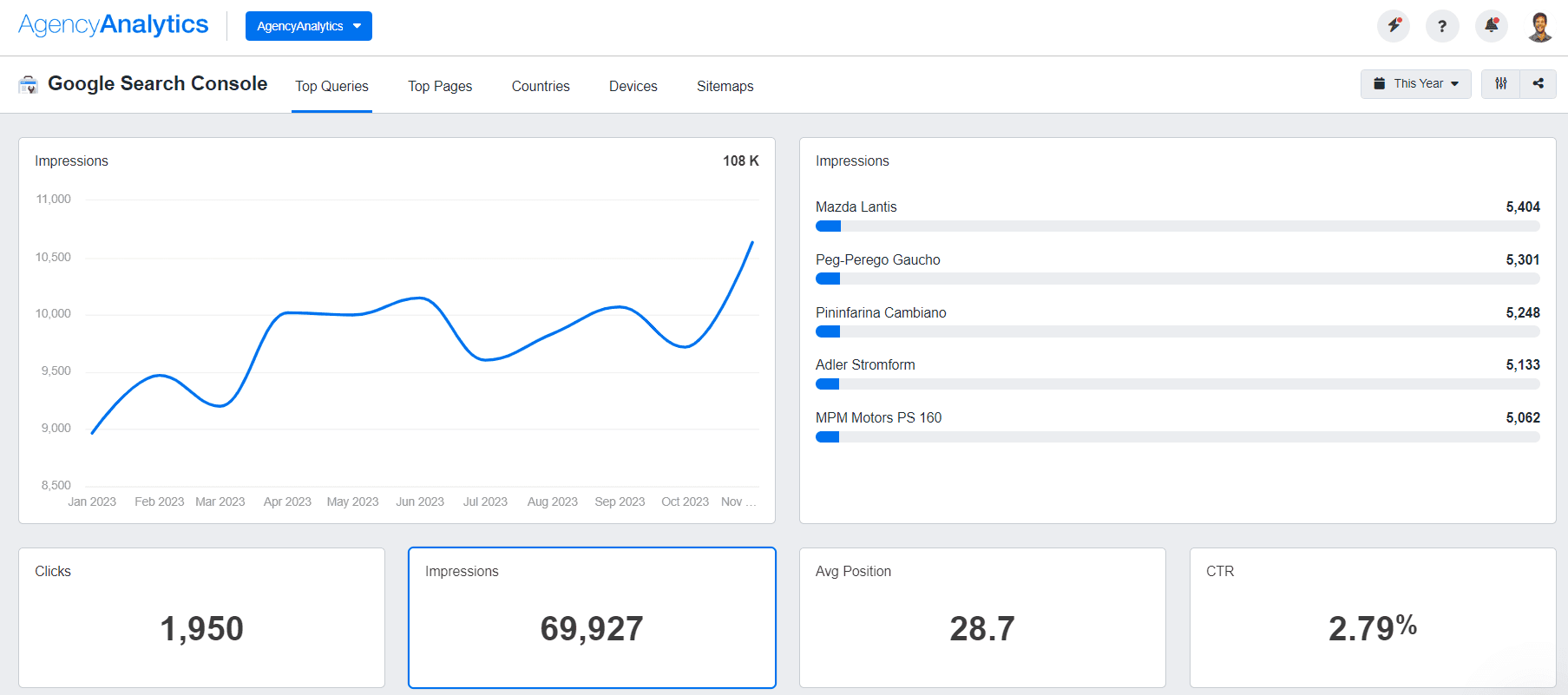
Run a technical SEO audit in just a few clicks. Use a tool like Google Search Console to identify sitemap errors, changes to search rankings and more–try it with AgencyAnalytics, free for 14 days.
Focus on Local SEO for Lawyers
In addition to optimizing a law firm’s website, prioritize local SEO efforts. It’s the only way to improve visibility in local search results–here’s how to get started.
A Google Business Profile
A crucial part of local SEO for lawyers is creating a Google Business Profile. It helps prospective clients discover law firms in specific areas and learn more about their services.
Google Business Profiles are essential for attorneys and law firms as they provide the most relevant business information to consumers in their area. A Google Business Profile helps maximize a firm's local presence, increase organic website traffic, and bring more inquiries and leads to the law firm.
Ryan Kapczynski, SEO Specialist, Premier Legal Marketing
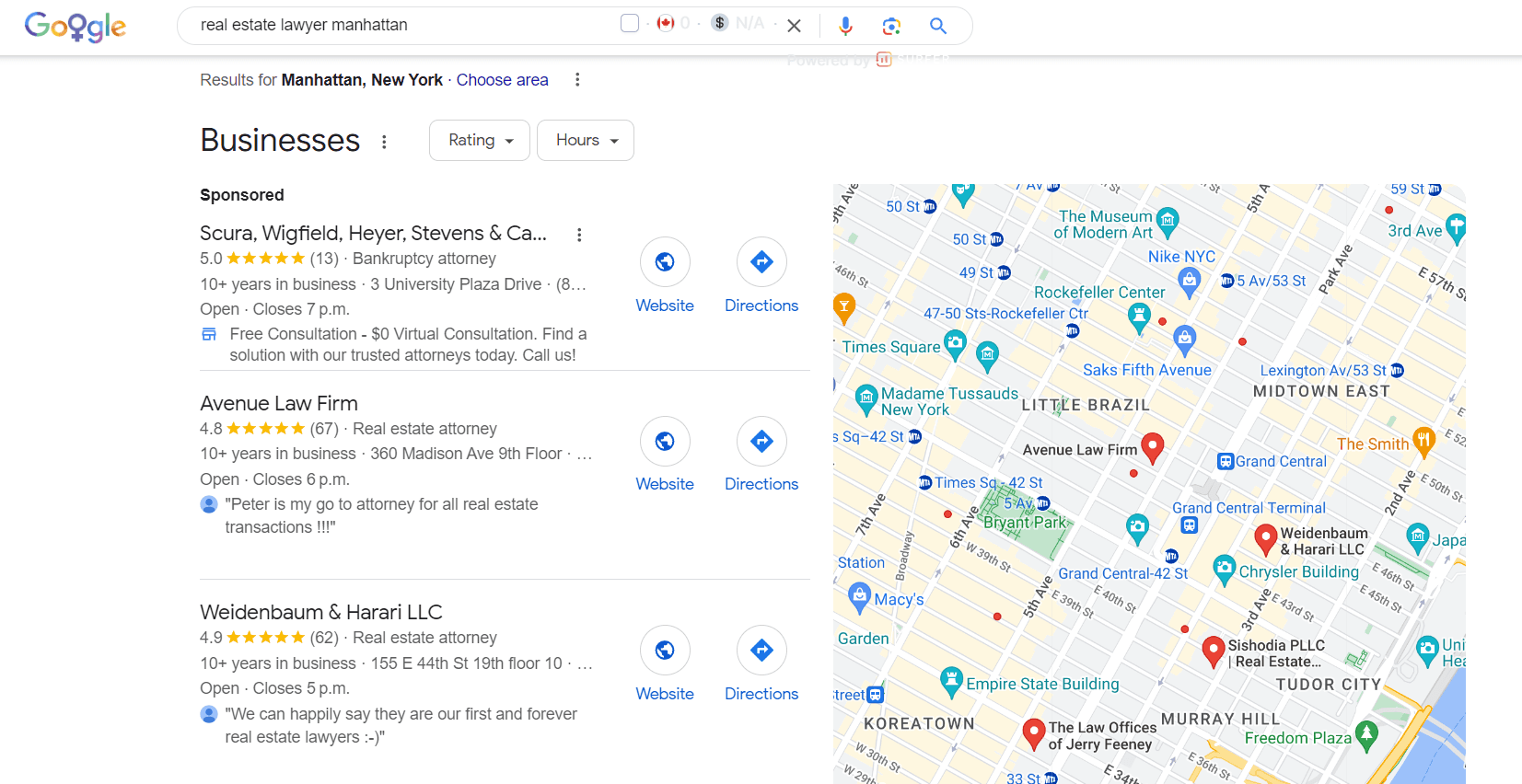
When creating a Google Business Profile for a law firm client, include details like:
Registered business name
Category and services
Hours of operation
Address and location
Photos and videos
Reviews
A NAP (Name, Address, and Phone Number) Profile on All Web Pages
Displaying the NAP (Name, Address, Phone Number) is a must-have for every page of a law firm's website. It ensures a user can easily access contact information without navigating away from the current page.
This convenience improves user experience and significantly increases the chances of engagement and inquiries (e.g., making a phone call to a law firm).
Local Citations
Aside from a Google Business Profile, list law firms in local, law-related directories (e.g., Avvo, FindLaw, and Super Lawyers).
This enhances a law firm's local visibility and makes it easier to find online. Remember to monitor these citations for accuracy. After all, you don’t want law firm clients to miss out on opportunities because of outdated information (like a deactivated website domain).
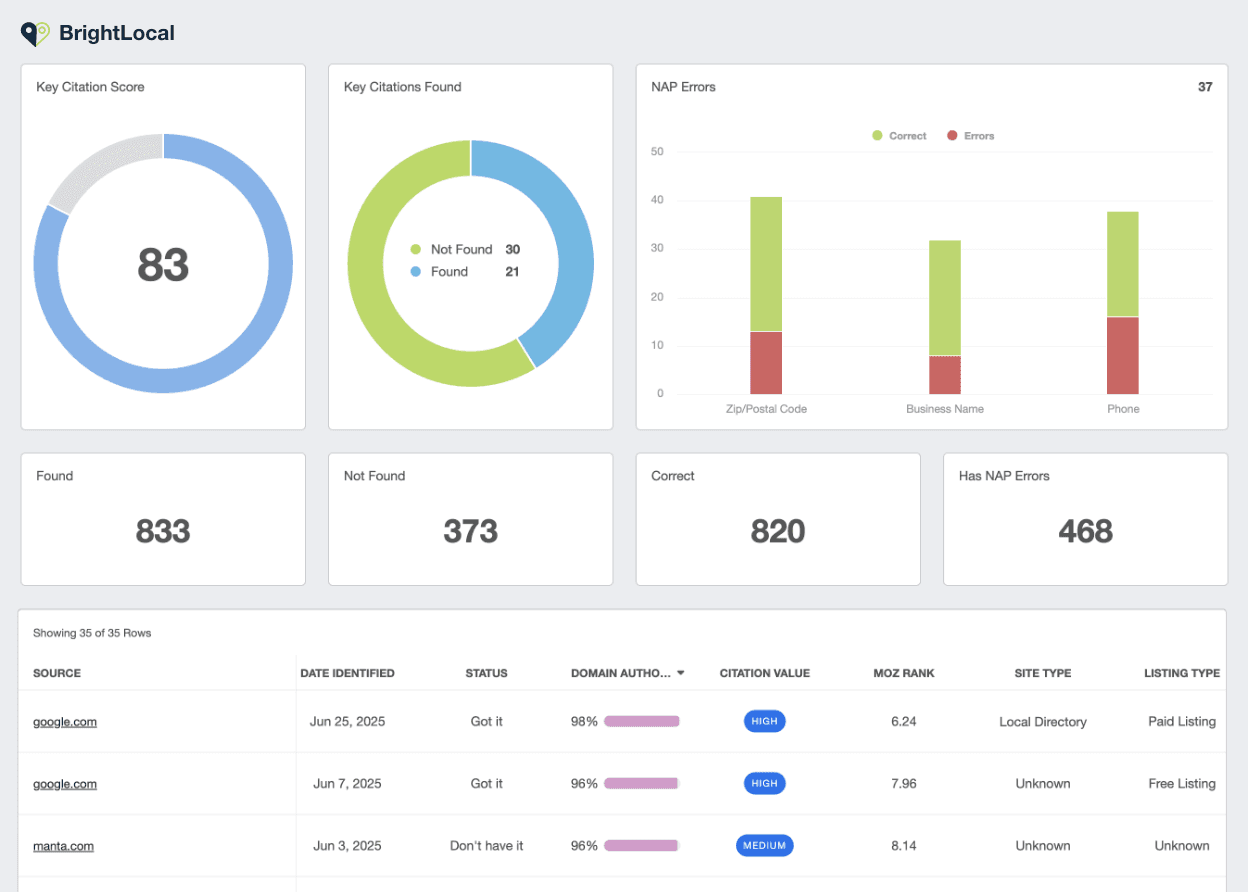
Help clients meet their law firm SEO goals. Streamline citation management and monitor the progress of local SEO efforts–it’s all possible with AgencyAnalytics, free for 14 days.
Local Schema Markup
Local schema markup involves inputting local-specific microdata into the HTML of a law firm’s website (e.g., business name, practice type, address, and postal code).
This extra step boosts visibility and may increase organic search rankings over time. It also leads to higher click-through rates since this detailed information is displayed in search snippets.
Online Reviews
Encourage law firms to check in with their clients and ask for reviews at strategic points (e.g., after winning a case).
It’s a strategic way to showcase their abilities, capture user-generated content, and build a solid online reputation.
The main thing around sourcing reviews is having a replicable process. Remember to add personalization. We have seen better results and response rates when the review request comes from the attorney who worked the case versus a generic email request from the firm, a paralegal, or a legal assistant.
Brian Craig, Founder and CEO, LegalScapes
Quality Backlinks
Another key off-page SEO factor is backlink acquisition, which shows potential clients that a law firm is credible and endorsed by others. This is especially important for the legal field since there’s so much at stake.
Effective link-building builds website credibility. As long as backlinks are done carefully–with thought, content, and relevance–they help rank for competitive keywords in verticals.
Peter Magee, Managing Director, Significant Digital
Plus, search engines take notice. A law firm with a strong backlink profile will likely show up favorably on the SERPs, which leads to more traction and lead generation.
Here are a few examples of where to source quality backlinks:
Authoritative legal directories (e.g., Justia)
Legal news sites (e.g., Law 360)
Legal Forums (e.g., TheLaw.com)
Bar associations (e.g., The State Bar of California)
Agency Tip: If your law firm client plans to run Google Local Service Ads to complement their SEO efforts, follow the steps to get Google Screened. This involves verifying backgrounds, licenses, and customer reviews. Upon successful verification, a green check mark will appear next to their local service ads.
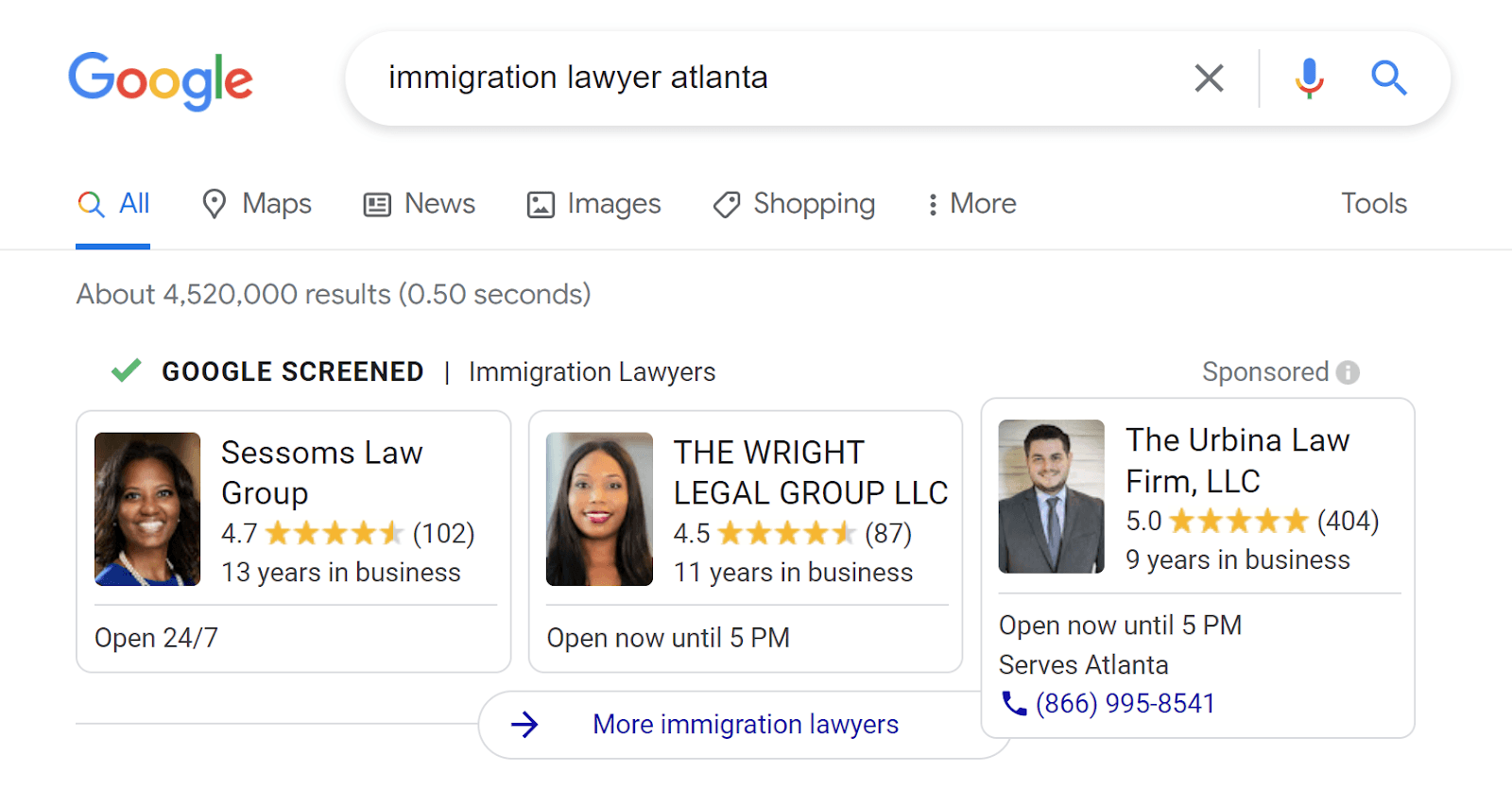
How Often Should Law Firm SEO Be Updated?
Now that we’ve covered the ins and outs of attorney SEO, you may wonder, “How often should this be updated?”
While there may be occasional changes to a law firm’s practice, there’s unlikely to be a complete overhaul of services every day. Of course–things will vary between law firms, and assessing individual client needs is essential.
As a guide, track how much work your agency does per legal SEO client. Based on this, decide on a reasonable timeframe for an SEO checkup (in most cases, weekly is a good cadence). It depends, though. For example, a law firm that requires a monthly blog post may not need a weekly SEO check.
Integrate a similar schedule to monitor reviews and ratings regularly. This allows your agency to keep on the pulse of reputation management and identify issues (e.g., an influx of unfavorable comments).
Monitor Law Firm SEO and Show Tangible Results
As we’ve covered, SEO for lawyers requires a multi-faceted approach. From conducting keyword research to creating helpful content, it’s an ongoing investment that yields long-term results.
That said, your agency needs a systematic approach to tracking law firm SEO performance. After investing in your agency’s services, it’s natural for clients to ask questions like:
"Has there been increased traffic on our law firm website?"
"Have there been significant changes to our search engine rankings?"
"How did our last SEO campaign perform?"
"Did our law firm receive any new reviews? What about our competitors?"
Let’s face it–there are a lot of SEO insights to keep track of (just ask any experienced law firm SEO agency).
While this data is available across various platforms (like Google Analytics and Google Search Console), it isn’t feasible to log into individual accounts every time. After all, you’ve got other clients and campaigns to manage.
What happens when your agency does more than just SEO for law firms? For starters, there are PPC ads, email campaigns, social media efforts,…. the list goes on.
No need to resort to manual reporting methods or toggling between platforms–simply invest in AgencyAnalytics! With this client reporting tool, your agency gets more than SEO reporting software–it’s a central hub for all your clients’ marketing metrics. Using local SEO reporting software also helps centralize review and GBP insights for attorneys.
Agency Tip: Simplify client reporting and showcase results effortlessly with a customizable law firm marketing report template—designed to meet the unique needs of legal marketing
Automatically retrieve data from over 80 platforms and stream it into visual SEO dashboards or reports. It’s that simple!
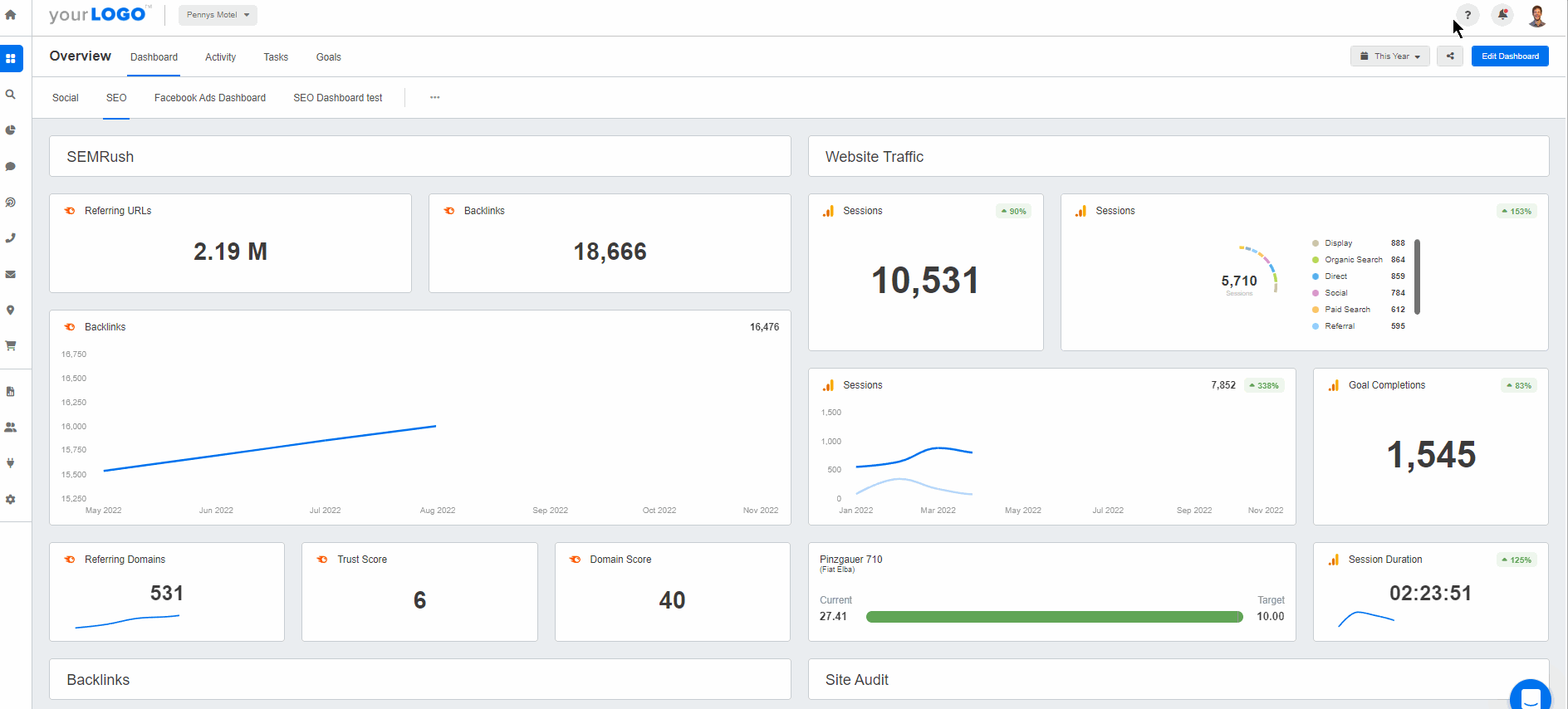
Help your law firm SEO clients meet their goals and attract more business. Invest in an all-in-one reporting tool to monitor performance–try AgencyAnalytics today, free for 14 days.

Written by
Faryal Khan is a multidisciplinary creative with 10+ years of experience in marketing and communications. Drawing on her background in statistics and psychology, she fuses storytelling with data to craft narratives that both inform and inspire.
Read more posts by Faryal KhanSee how 7,000+ marketing agencies help clients win
Free 14-day trial. No credit card required.





